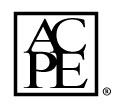|
|
ARB 337
|
ARB 406
|
ARB 469
|
|
SESSION 1
12:15 pm – 1:00 pm
|
Dan Ilges, Pharm.D.
Treatment of Carbapenem-Resistant Enterobacterales in 2020
|
Lavinia Salama, Pharm.D.
Emerging Therapies for the Treatment of Community-Acquired Pneumonia
|
Makenzie Hollingsworth, Pharm.D.
Treatment of Hereditary Angioedema
|
|
1:00 pm – 1:05 pm
|
Break for Transition between Speakers
|
||
|
SESSION 2
1:05 pm – 1:50 pm
|
Michelle Sproat, Pharm.D.
Introduction to Biosimilars
|
Smita Rausaria, Pharm.D.
Steroids in Septic Shock: Yes, No, or Maybe?
|
Deja Finley, Pharm.D.
The use of Long-Acting Antipsychotics in Patients with Schizophrenia during the Coronavirus Disease-19 Pandemic
|
Registration is free, but is required in advance. Due to limited space, only those participants who register before 5:00 PM on Friday, October 23, 2020 will be able to request parking access on campus.
PARKING: To request parking, please first register for your desired sessions. Then, complete the parking questionnaire using the link above, or complete your parking request by clicking here>>>. If you do not request parking on our campus, or if you do not submit your request by the deadline, you will be re-directed upon arrival.
ATTENDANCE: All live participants will be required to sign in on the paper sheets, located within each room. Paper sign-in sheets will be reconciled against completed evaluations. Attendance for the virtual sessions will be captured once a participant joins the session and will be reconciled with completed evaluations. Any sessions that you did not attend will be removed from your account within two weeks following the seminars.
CPE CREDIT: Immediately following the presentation, registered participants will receive an email with a link to the evaluation. Within one week after attending the session, participants must complete this online evaluation. The CPE Administrator will submit each participant’s NABP number and date of birth combination to CPE Monitor for continuing education credit, no later than two weeks after the live presentation. Only ONE session may be claimed for each time block. If multiple concurrent sessions are claimed, or if a session is claimed that is not reflected on the paper sign or the attendance roster within Microsoft Teams Meeting, the offending participant forfeits CE credit.
SPECIAL ACCOMMODATIONS
Attendees of all abilities are welcome to participate. If you require reasonable accommodations, please notify Nicole Fields via email at Nicole.Fields@uhsp.edu in advance so that she may secure resources as soon as possible. Every effort will be made to make accommodations where necessary.
Date: Oct 28, 2020 12:00 PM - 02:00 PM
Fee
CE Hours
Activity Type
- Knowledge
Accreditation(s)

|
St. Louis College of Pharmacy at the University of Health Sciences and Pharmacy in St. Louis is accredited by the Accreditation Council for Pharmacy Education as a provider of continuing pharmacy education. To learn more about the specific program information, including universal activity numbers (UAN's) and learning objectives, please expand the modules below. Following successful completion of an evaluation, CE credit will be automatically reported to NABP through the CPE Monitor system, using the NABP ePID numbers and date of birth (MMDD) stored in participants' user profiles. Follow this link to learn more about CPE Monitor and the credit reporting process » Participants are responsible for ensuring receipt of credit; no credit can be corrected or awarded if more than 60 days have passed from the date of the event or if the home study is expired.
It is the policy of St. Louis College of Pharmacy at the University of Health Sciences and Pharmacy in St. Louis, to ensure balance, independence, objectivity and scientific rigor in all its educational programs. All faculty participating in this program are expected to disclose to the program audience any real or apparent conflicts of interest related to the content of the presentation.
|
Objectives
- Summarize the epidemiology of carbapenemases.
- Describe disadvantages of traditional CRE treatment regimens (i.e. colistin-based regimens).
- Select appropriate antimicrobial regimens to treat CRE infections.
Speaker(s)/Author(s)
|
Daniel Ilges, Pharm.D. |
Activity Number
0033-0000-20-041-L01-PCE Hours
Location
Objectives
- Identify risk factors and emerging trends of resistance in community-acquired bacterial pneumonia (CABP).
- Identify the 2019 ATS/IDSA guideline recommendations for the treatment of CABP.
- Discuss emerging therapies in the treatment of CABP, including mechanisms of action, dosage forms, costs, safety and efficacy data.
- Identify potential place in therapy for the emerging agents for CABP.
Speaker(s)/Author(s)
|
Lavinia Salama, Pharm.D. |
Activity Number
0033-0000-20-057-L01-PCE Hours
Location
Speaker(s)/Author(s)
|
Makenzie Hollingsworth, Pharm.D. |
Activity Number
0033-0000-20-054-L01-PCE Hours
Location
Speaker(s)/Author(s)
|
Michelle Sproat, Pharm.D. |
Activity Number
0033-0000-20-055-L01-PCE Hours
Initial management of a patient with septic shock is widely accepted and consists of early administration of broad-spectrum antibiotics, crystalloid or colloid fluid resuscitation, and use of vasopressor support to improve hemodynamics. The management of patients with septic shock refractory to fluids and initial vasopressors is less consistent, especially with regard to the administration of corticosteroids. This session will discuss the available literature regarding optimal use of corticosteroids in septic shock and will specifically focus on articles published in the last 5 years and their perceived impact on patient care.
Speaker(s)/Author(s)
|
Smita Rausaria, Pharm.D. |
Activity Number
0033-0000-20-056-L01-PCE Hours
arisen due to the COVID-19 pandemic and subsequent quarantine. This presentation reviews the implications for the use of long-acting injectable antipsychotics (LAIs) in patients with schizophrenia to manage psychotic symptoms, reduce hospitalizations, and maintain adherence during the COVID-19 pandemic. Topics to be discussed include the general landscape of mental health before and during the COVID-19 pandemic, treatment recommendations for schizophrenia, recommendations for the use of long-acting injectable antipsychotics, and the role of the community pharmacist in treating schizophrenia during the pandemic. The goal of the presentation is to provide guidance on how to evaluate the appropriateness of the use of LAIs and their impact on adherence in patients with schizophrenia.
Speaker(s)/Author(s)
|
Deja Finley, Pharm.D. |
